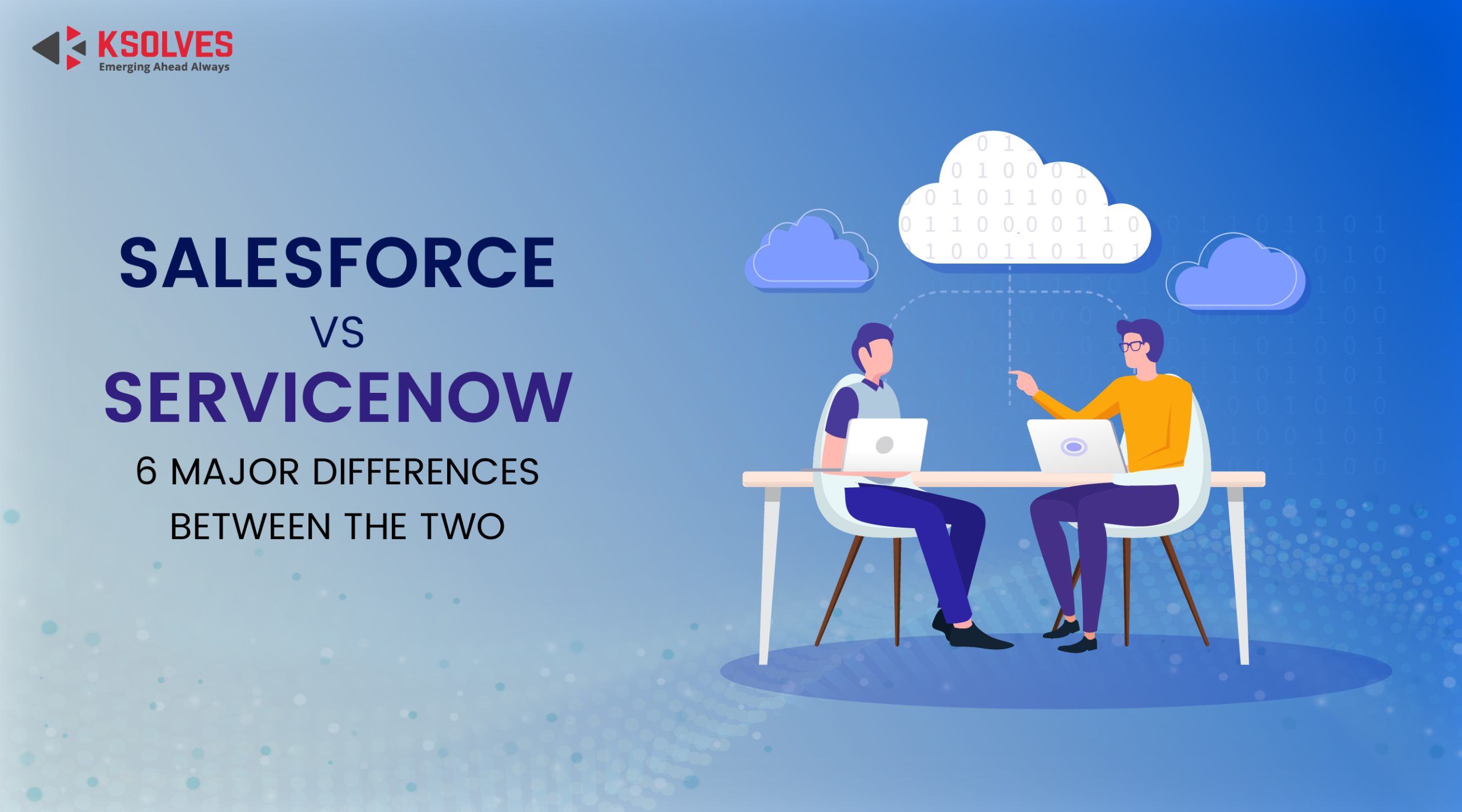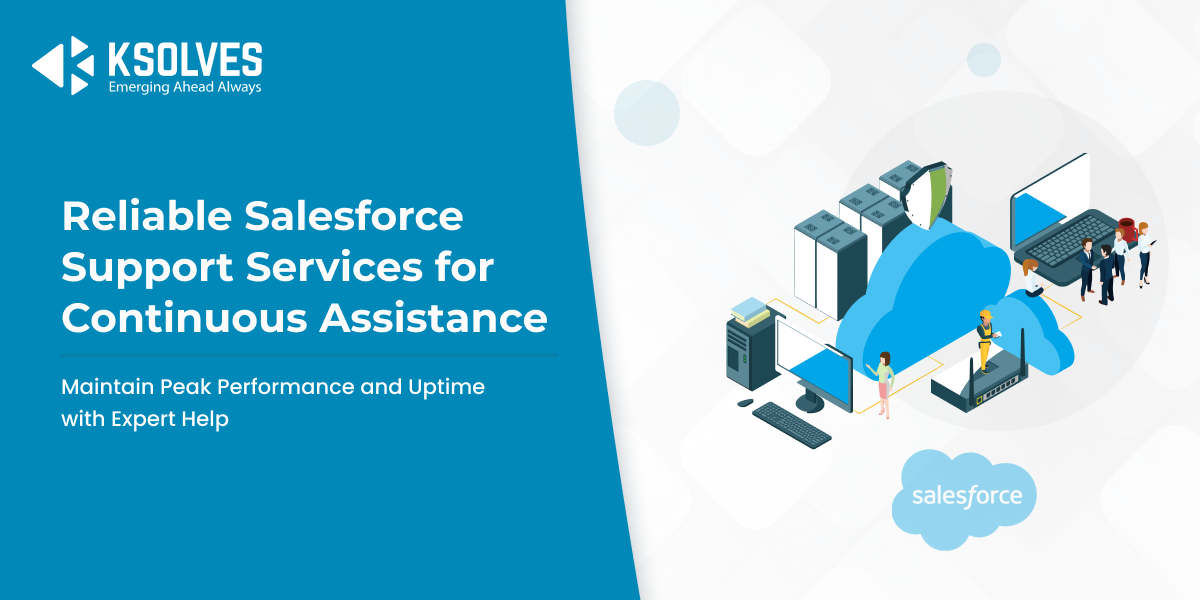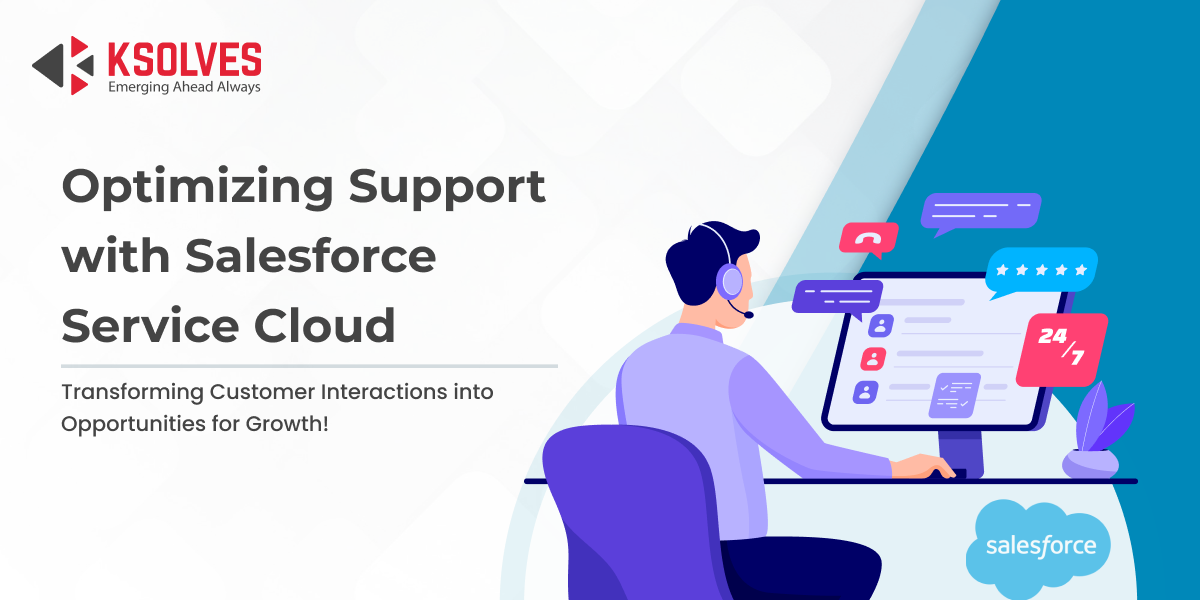Salesforce vs. ServiceNow: Which is best? [2025]
Salesforce
5 MIN READ
January 17, 2025
![]()

With the rise in the use of cloud software in recent years, CRM has become a vital business enabler across marketing, sales, support, and accounting departments. Two prominent contenders in this arena are Salesforce and ServiceNow. While both offer robust solutions, they cater to distinct business needs.
Imagine Salesforce as a high-performance sports car, sleek, fast, and designed for optimal customer relationship management (CRM). It’s engineered to accelerate sales, marketing, and customer service operations, providing a seamless ride on the smooth highways of customer engagement.
On the other hand, envision ServiceNow as a versatile SUV, rugged, reliable, and built to navigate the complex terrains of IT service management (ITSM) and enterprise workflows. It’s tailored to handle the diverse challenges of internal processes, ensuring stability and control across various departments.
Both vehicles share essential components, engines, seats, and wheels, but each is meticulously crafted for specific environments and purposes. Choosing between them depends on your organization’s unique requirements:
- Salesforce is ideal for businesses seeking to enhance customer interactions, drive sales, and implement comprehensive CRM strategies.
- ServiceNow excels for organizations aiming to streamline IT services, automate workflows, and improve internal process efficiencies.
Understanding these distinctions is crucial in selecting the platform that aligns best with your business objectives.
What Does Salesforce Do?
Salesforce is a cloud-based customer relationship management (CRM) platform that connects customers and businesses through apps for sales, support, marketing, and more. Because of its customizability and broad network of add-ons for sales, marketing, customer care, platform as a service, and more, businesses are flocking to it.
Key Features of Salesforce:
- Sales Cloud: Streamlines the sales process by providing tools for managing leads, opportunities, and accounts.
- Service Cloud: Enhances customer service operations with features like case management and a knowledge base.
- Marketing Cloud: Enables personalized marketing campaigns across various channels.
- Commerce Cloud: Facilitates seamless e-commerce experiences for customers.
- Analytics Cloud: Provides data visualization and business intelligence tools.
- AppExchange: Offers a marketplace for third-party applications that integrate with Salesforce.
- Trailhead: A free online learning platform with courses focused on Salesforce technologies.
Salesforce CRM provides sales teams with access to real-time customer data in one location, along with insights through dashboards and reports. Its core feature is contact and account management, allowing the storage of contact and conversation records in a single location. Additional capabilities include project management, revenue and lead targets, and reporting features that make the solution enterprise-ready.
By leveraging these features, businesses can enhance customer relationships, improve sales performance, and streamline operations.
What Does ServiceNow Do?
ServiceNow is a cloud-based platform that offers a suite of applications designed to streamline and automate various business operations, including IT service management (ITSM), business management, and operations management. Its primary focus is on enhancing client infrastructure management through a comprehensive service model.
Key Features of ServiceNow:
- IT Service Management (ITSM): Streamlines IT operations by automating incident, problem, and change management processes.
- Business Management: Facilitates the management of business processes, projects, and portfolios to align with organizational goals.
- Operations Management: Optimizes day-to-day operations through automation and efficient resource management.
- Field Service Management: Enhances the management of field operations, reducing costs and increasing operational efficiency.
- App Engine: Allows for the rapid development and deployment of custom applications to meet specific business needs.
- Mobile Applications: Provides mobile apps that enable users to access and manage services on the go.
- Experience UI Builder: Offers tools to create personalized user interfaces for applications.
- Now Assist: Integrates generative AI capabilities to enhance decision-making and automate routine tasks.
By leveraging these features, ServiceNow enables organizations to automate workflows, improve service delivery, and enhance overall operational efficiency.
Six Significant Differences Between Salesforce & ServiceNow
Salesforce and ServiceNow are both cloud-based platforms that enhance business operations, but is ServiceNow similar to Salesforce?
In the Salesforce vs ServiceNow comparison, the following are the six main distinctions. Take a look and find out: Which is Best?
Salesforce vs ServiceNow: Performance
With today’s unparalleled reliance on data and technology, any CRM outage is a true nightmare for businesses, since it may result in a complete service collapse. While cloud providers are typically effective at maintaining uptime, ServiceNow or Salesforce outage can have effects ranging from unpleasant to disastrous, depending on the length of the downtime and your organization’s reliance on that specific technology.
Consider having your customer service database fall down during business hours, or experiencing an IT problem while being unable to process IT tickets. These kinds of difficulties may occur with either Salesforce or ServiceNow. Plus, these are undesirable business risks that are not avoidable.
Salesforce CRM boasts a 99.9 percent uptime. While this appears to be excellent, it implies an annual downtime of around 8 hours and 46 minutes. ServiceNow CRM, on the other hand, guarantees 99.8 percent availability, implying an average outage of 17 hours and 30 minutes. Thus, Salesforce is the clear winner in this area when compared with ServiceNow as it claims to have a more strict uptime guarantee.
Salesforce vs ServiceNow: Customer Support
When comparing Salesforce with ServiceNow, the quality and speed of assistance are critical factors to consider. Salesforce provides three levels of customer service. Salesforce Trailhead and the Trailblazer community provide the standard level of assistance. Customers who want more assistance can upgrade to the Premier tier. Apart from these, you can get the best tech support for Salesforce from private vendors as well.
ServiceNow, on the other hand, allows customer service to collaborate with other departments and discover and handle issues more quickly. It saves money and offers round-the-clock phone help to all clients via the Contact Support page. You can also reach out to the ServiceNow staff via their website’s live chat. Although ServiceNow support is the best option for budget-conscious consumers, large businesses prefer the proactive support and dedicated account reps provided by Salesforce’s enterprise level.
Salesforce vs ServiceNow: Innovation
AI and process automation are two of the best-selling topics at the moment. Both Salesforce and ServiceNow professionals are actively working on these technologies. Salesforce Einstein is a powerful artificial intelligence technology employed by Salesforce. ServiceNow, on the other hand, is not behind the times with its own chatbot.
Both platforms are the harbingers of workplace innovation on average. Sales teams benefit more from customer data analysis using Salesforce Einstein’s CRM interface than from Service Now analytics.
As a result, Salesforce AI collects far more useful information about consumer behavior, shopping trends, support requests, and other topics than the ServiceNow AI. With Salesforce, there is always great potential for innovation.
Salesforce vs ServiceNow: Cost-Effectiveness
The Essentials edition of Salesforce’s Sales Cloud costs $25 per user per month, $100 for the Salesforce Professional package, and $150 for the Enterprise plan. For $300 per month, you can have an unlimited version.
Pricing for ServiceNow products, on the other hand, is not publicly available. Instead, the website invites you to fill out a form to acquire a bespoke price.
ServiceNow calculates your ultimate subscription cost based on a complicated matrix that includes firm size, industry, and much more.
In the Salesforce vs ServiceNow comparison, we feel Salesforce’s pricing is more transparent. As a result, we think Salesforce is the clear winner in this area.
Salesforce vs ServiceNow: Usability
Salesforce is a software-as-a-service company that specializes in CRM for customer care, sales, and marketing. With its wide range of products and high level of customization, it is among the best CRM tools for travel agencies and various other industries.
Its wide range of CRM capabilities, excellent range of integration possibilities, and an unmatched degree of customization make Salesforce the premier choice for users. Also, the system’s adaptability allows it to be set up in just a few minutes. Whereas ServiceNow CRM is a web-based framework.
When it comes to upgrading or updating ServiceNow tools is not a simple or quick process. This undoubtedly requires expert consultation and support. In addition, Salesforce is committed to making on-demand corporate apps available to all people, including those who use assistive devices like voice recognition software and screen readers.
ServiceNow CRM, on the other hand, does not have such functionality. As a result, Salesforce CRM is considered to be best when compared with ServiceNow.
Salesforce vs ServiceNow: Integrations
Salesforce includes hundreds of app integrations and built-in features that work together to improve the tool’s core CRM capabilities in an almost seamless way. Some of these integrations are built into the tools themselves.
Thus, it does not require the help of developers to fully integrate it into your system. Salesforce’s customization, integration, and settings place Salesforce at the top of the list. ServiceNow, on the other hand, finds it difficult, and the integration process might be time-consuming. Thus, doubles the efforts of experts.
Also, it is less convenient as it does not provide the necessary customer information. As a result, Salesforce is more convenient because it has easier customer management. This aids in the development of long-term relationships and associations with customers.
Salesforce vs ServiceNow
| Feature | Salesforce | ServiceNow |
| Primary Focus | Customer Relationship Management (CRM) | IT Service Management (ITSM) and enterprise workflow automation |
| Key Offerings | Sales Cloud, Service Cloud, Marketing Cloud, Commerce Cloud | IT Operations Management, HR Service Delivery, Customer Service Management |
| Uptime Guarantee | 99.9% uptime, equating to approximately 8 hours and 46 minutes of annual downtime | 99.8% uptime, equating to approximately 17 hours and 30 minutes of annual downtime |
| Support Tiers | Standard support via Trailhead and Trailblazer Community; Premier support available | 24/7 phone support for all clients; live chat support via the website |
| AI Capabilities | Salesforce Einstein for AI-driven insights and automation | AI-powered chatbots and task intelligence for process automation |
| Pricing Transparency | Clear pricing tiers: Essentials ($25/user/month), Professional ($100/user/month), Enterprise ($150/user/month), Unlimited ($300/user/month) | Custom pricing based on factors like company size and industry; requires direct inquiry for quotes |
| Ease of Use | User-friendly interface with extensive customization options | Web-based framework; customization may require expert consultation |
| Integration | Hundreds of app integrations and built-in features for seamless operation | Integration can be time-consuming and may require developer assistance |
| User Ratings | 4.4 stars based on 503 reviews | 4.2 stars based on 129 reviews |
Final Verdict
After analyzing both systems on a range of metrics, we found it to be a close decision in the Salesforce vs ServiceNow battle. However, Salesforce comes out on top by a narrow margin. Salesforce is a cutting-edge platform with plenty of space for growth.
As a result, many businesses choose Salesforce over ServiceNow. Unfortunately, no service provider, including Salesforce, can guarantee 100 percent uptime. As a result, companies must rely on their own efforts and be ready for service interruptions on a regular basis.
To mitigate risks, having a robust disaster recovery plan in place is crucial. Additionally, partnering with a trusted Salesforce consultation services provider can help address any issues promptly.
Working with a Salesforce premier support company ensures you receive expert guidance and assistance in developing a comprehensive disaster recovery strategy. Many organizations turn to Ksolves, recognized as a leading Salesforce development company, to navigate such challenges successfully.
![]()




AUTHOR
Salesforce
Md. Asad Khan, an expert Technical Project Manager at Ksolves, who is a certified Salesforce architect at Ksolves, brings 7+ years of experience. He specializes in FSL, B2B, Service & Sales Cloud, and Non-profit cloud, excelling in APEX, Aura Component Framework, Lightning Components, Triggers, Visualforce, and creating insightful dashboards and reports.
Share with